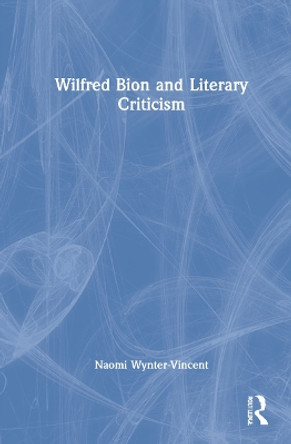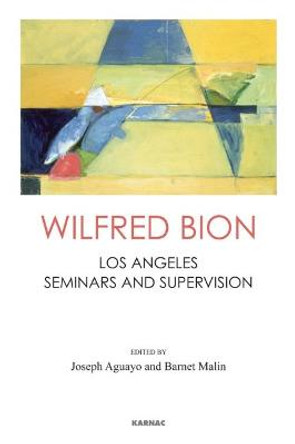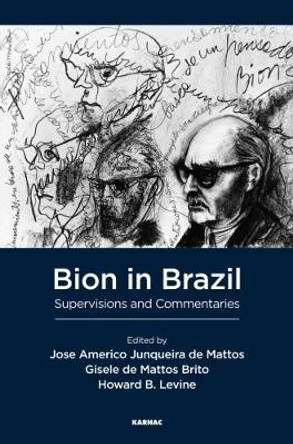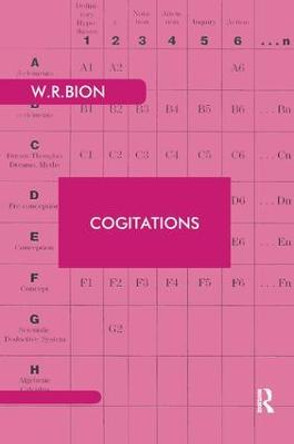Description
Wilfred Bion and Literary Criticism introduces the work of the British psychoanalyst, Wilfred Bion (1897-1979), and the immense potential of his ideas for thinking about literature, creative process, and creative writing.
There is now renewed interest in Bion's work following the publication of his Complete Works but the complexities of his theory and his distinctive style can be forbidding. Less well-known than Freud or Lacan, the work of Wilfred Bion nevertheless offers new insights for psychoanalytic literary criticism and creative writing. For newer readers of his work, this book offers an engaging introduction to several of Bion's key ideas, including his theory of thinking (the 'thought without a thinker'), the container/contained relationship, alpha-function; alpha-elements, beta-elements, and bizarre objects; K and -K; the Grid, O, and the caesura. It also offers a way in to Bion's astonishing and challenging experimental work, A Memoir of the Future, and explores the impact of his devastating personal experiences as an officer during the First World War. Each chapter of Wilfred Bion and Literary Criticism draws on one or more specific aspects of Bion's theory in relation to creative texts by Sigmund Freud, Stevie Smith, B.S. Johnson, Mary Butts, Jean Rhys, Nicholas Royle, J.G. Ballard, and Wilfred Bion himself.
The first full-length study to explore the potential of Bion's ideas for literary criticism, Wilfred Bion and Literary Criticism introduces his complex and extensive work for a new audience in an accessible and engaging way, and will be of great interest to scholars of creative writing, literary criticism, and psychoanalysis.
About the Author
Naomi Wynter-Vincent holds degrees from the University of Cambridge, University of Sussex, and University College London. She completed her PhD at the University of Sussex. She has presented her work on Wilfred Bion at conferences in the UK, Italy, Finland and Brazil. Naomi works in private practice in London and Luton as a therapist and coach.
Reviews
"This book will change how you think about thinking. Naomi Wynter-Vincent's tremendously enlivening study draws on significant, consequential affinities between Bion's ideas and the work of literary writers. We come to understand how Bion thought and how he considered thinking. In the process, we benefit from clear, searching accounts of his idiosyncratic and highly influential psychoanalytic inventions (alpha-function, beta-elements, bizarre objects, O, and the Grid, to name a few). Wilfred Bion and Literary Criticism reminds us how exciting, inventive, necessary and sometimes maddening thinking can be, and how courageous and important a thinker Bion is for us today." - Sarah Wood, Reader in English Literature and Literary Theory at the University of Kent (retired), Psychoanalytic Psychotherapist in private practice
"Wynter-Vincent has written a luminous and deeply compelling book that will appeal to anyone with an interest in creativity, literature and psychoanalysis. It is both a wonderfully clear introduction to Wilfred Bion's work, and a series of enthralling encounters that puts his thinking in contact with Freud, Stevie Smith, B.S. Johnson, Jean Rhys, J.G. Ballard and other writers, to remarkably illuminating effect." - Nicholas Royle, Professor of English, University of Sussex.
'Wynter-Vincent has written a luminous and deeply compelling book that will appeal to anyone with an interest in creativity, literature and psychoanalysis. It is both a wonderfully clear introduction to Wilfred Bion's work, and a series of enthralling encounters that puts his thinking in contact with Freud, Stevie Smith, B.S. Johnson, Jean Rhys, J.G. Ballard and other writers, to remarkably illuminating effect.'
Nicholas Royle, Professor of English, University of Sussex
'This book will change how you think about thinking. Naomi Wynter-Vincent's tremendously enlivening study draws on significant, consequential affinities between Bion's ideas and the work of literary writers. We come to understand how Bion thought and how he considered thinking. In the process, we benefit from clear, searching accounts of his idiosyncratic and highly influential psychoanalytic inventions (alpha-function, beta-elements, bizarre objects, O, and the Grid, to name a few). Wilfred Bion and Literary Criticism reminds us how exciting, inventive, necessary and sometimes maddening thinking can be, and how courageous and important a thinker Bion is for us today.'
Sarah Wood, Reader in English Literature and Literary Theory at the University of Kent (retired); Psychoanalytic Psychotherapist in private practice
'Wilfred Bion and Literary Criticism is psychoanalytic literary criticism at its most nuanced and self-reflective. Even when Wynter-Vincent suggests that Bion's oeuvre offers a discursive account of moments in literature that border on the inexplicable and the bizarre [...] she scrupulously eschews a tendency to posit these literary texts as straightforward Bionian allegories, lacking a formal and aesthetic specificity of their own. Indeed, her close readings uphold those ground rules of literary criticism that are often overlooked in reductive psychoanalytic readings of literature.'
Jivitesh Vashisht, Junior Anniversary Fellow at IASH, Edinburgh, and the Brotherton Fellow at the University of Leeds. To read this review in full, please see the following: Jivitesh Vashisht, Psychoanalysis, The Year's Work in Critical and Cultural Theory, 2022; https://doi.org/10.1093/ywcct/mbac015
Book Information
ISBN 9780367439453
Author Naomi Wynter-Vincent
Format Paperback
Page Count 178
Imprint Routledge
Publisher Taylor & Francis Ltd
Weight(grams) 453g










